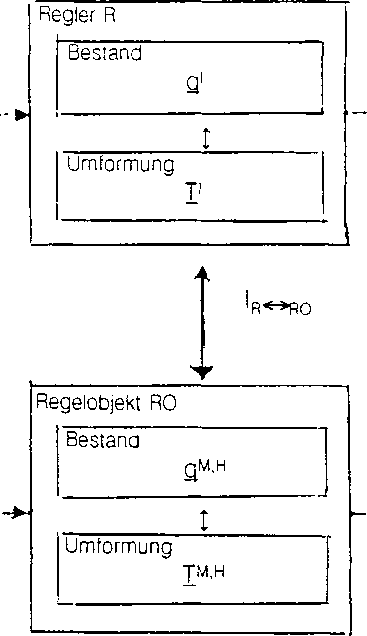50
Elementarsystem E
×∈l --------1- -
Onformationseinfuhr)
Xem,h-------
<Einfuhr von Stoffen
∪nd Energien)

* ye'
(Informationsausfuhr)
* Yem,h
(Ausfuhr von Stoffen
und Energien)
Abb. 5.1: Regler und Regelobjekt in Elementarsystemen
Im Kontext der allgemeinen Systemeigenschaften (vgl. Abschnitt 2.1) fixiert der
genetische Bauplan nach Ansicht des Autors Funktionen (Aufgaben und
Aktionsfelder) des Organismus und seiner Teile und verfestigt sich Strukturell
insbesondere über die Regelprozesse, die den Organen und anderen Teilen des
Organismus Offensichtlich keine Starren Instruktionen geben, sondern Iimitierten
Spielraum für Konkurrenz um Nahrung Iassen.
Diese biologisch-systemtheoretische Sicht gibt für die ðkonomisehe Analyse
zahlreiche Anregungen, denen der Autor vor alɪem im folgenden Abschnitt
nachgehen will. Spezieil auf Okonomische Elementarsysteme bezogen, wie sie
unter Abschnitt 4 Charakterisiert werden und - je nach Untersuchungszweck -
als "Arbeitsplatz", "Kostenstelle", "Betrieb", "Unternehmung" Oder "Haushalt"
More intriguing information
1. The name is absent2. The name is absent
3. Benefits of travel time savings for freight transportation : beyond the costs
4. The effect of classroom diversity on tolerance and participation in England, Sweden and Germany
5. The name is absent
6. The name is absent
7. The problem of anglophone squint
8. Examining Variations of Prominent Features in Genre Classification
9. The name is absent
10. Hemmnisse für die Vernetzungen von Wissenschaft und Wirtschaft abbauen